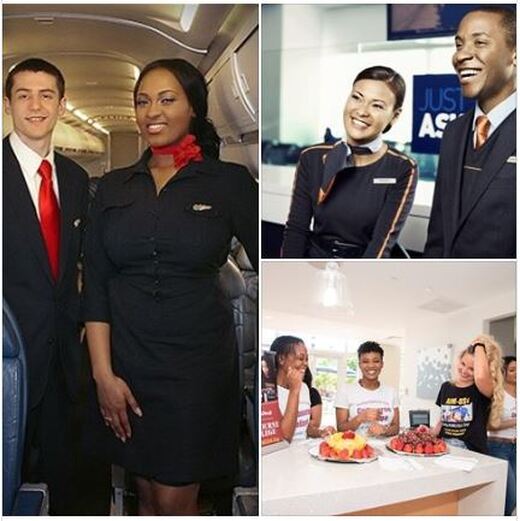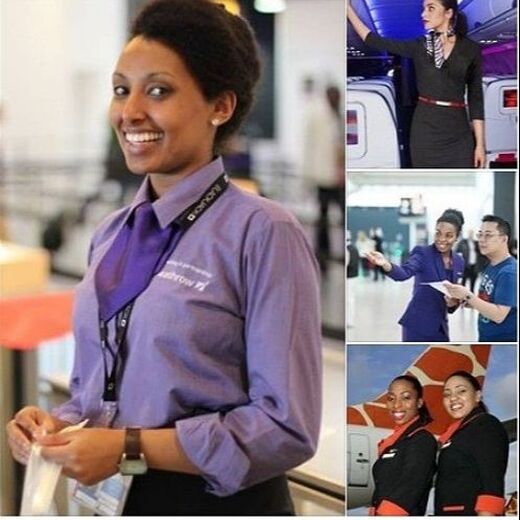Professional Certificate In Handling Air Passengers: Airline And Airport Operations
Do you love travelling, enjoy meeting people, and want to make a living from something that you love?
If your answer to all of the above is yes, AimU gives passionate people like you the knowledge and tools to accomplish their dreams of working in the airline and aviation industry. This Sixteen (16) Week Professional Certificate In Handling Air Passengers: Airline And Airport Operations is the perfect opportunity to get the travel experience, practice, and soft skills needed in airline and airport passenger service operations.
You can also choose a diploma and degree program covering airline and airport operation management, cabin crew roles for flight attendants and passenger agents; travel and tourism management; and more when you apply for the Level 5 International Travel And Tourism Management (Aviation).
You can also choose a diploma and degree program covering airline and airport operation management, cabin crew roles for flight attendants and passenger agents; travel and tourism management; and more when you apply for the Level 5 International Travel And Tourism Management (Aviation).
CERTIFICATE COURSE OUTLINE
MODULE 1: Handling Air Passengers (NC)
The processing of passengers as they pass through airports is at the core of the travel experience. For many, it will be the first and last contact they will have with airline staff on their journey. You'll develop knowledge of core responsibilities in airport operations in dealing with the increasing volumes of passenger traffic, security restrictions, check-in options, and the demand for punctuality and customer care to deliver competitive and efficient passenger handling. Understanding the processes involved and the mandatory and optional services and facilities available to departing and arriving passengers at airports are key to being able to meet these requirements as part of the travel experience. It is essential to also understand how these are coordinated across the many organizations and stages of the process, including efficient monitoring and management of passenger flows. This module will help you to develop working knowledge and understanding of the facilities and services available to both arriving and departing passengers, how the processes are shared and coordinated across organizations, and put you right in the middle of developing your own operational knowledge and hands-on passenger service skills in various commercial airline and airport roles.
MODULE 2: Onboard Passenger Operations (NC)
The course also provides skills of coordinating onboard operations and the knowledge how cabin crew teams are led in order to maintain industry safety and service standards. You will have the opportunity to see onboard operations from a bird’s eye view and explore onboard cabin operations from the viewpoint of the cabin leader and the flight crew. This will give you an important context for the study of aviation and link to leadership, teamwork and regulatory procedures. You will:
BLENDED METHOD OF COURSE DELIVERY
TEACHING AND ASSESSMENT METHODS
TUITION, ENTRY REQUIREMENTS, START DATES AND THE COURSE FEES
Course Fees
Entry Requirements
The Application Process
Program Start Dates
CAREER, VENDOR CERTIFICATION AND COLLEGE CREDITS:
On the successful completion of this course you can develop your careers in the travel and tourism sector through:
If you've considered and this is the life that you want, then the next step is simple:
REGISTER NOW FOR THE NEXT COURSE STARTING SOON
The processing of passengers as they pass through airports is at the core of the travel experience. For many, it will be the first and last contact they will have with airline staff on their journey. You'll develop knowledge of core responsibilities in airport operations in dealing with the increasing volumes of passenger traffic, security restrictions, check-in options, and the demand for punctuality and customer care to deliver competitive and efficient passenger handling. Understanding the processes involved and the mandatory and optional services and facilities available to departing and arriving passengers at airports are key to being able to meet these requirements as part of the travel experience. It is essential to also understand how these are coordinated across the many organizations and stages of the process, including efficient monitoring and management of passenger flows. This module will help you to develop working knowledge and understanding of the facilities and services available to both arriving and departing passengers, how the processes are shared and coordinated across organizations, and put you right in the middle of developing your own operational knowledge and hands-on passenger service skills in various commercial airline and airport roles.
MODULE 2: Onboard Passenger Operations (NC)
The course also provides skills of coordinating onboard operations and the knowledge how cabin crew teams are led in order to maintain industry safety and service standards. You will have the opportunity to see onboard operations from a bird’s eye view and explore onboard cabin operations from the viewpoint of the cabin leader and the flight crew. This will give you an important context for the study of aviation and link to leadership, teamwork and regulatory procedures. You will:
- Demonstrate how onboard passenger operations are coordinated
- Plan and practice the role and responsibilities of the flight attendant and senior cabin crew member
- Use the chain of command system for routine and emergency situations
- Show how to maintain security onboard aircraft
- Provide hospitality service
BLENDED METHOD OF COURSE DELIVERY
- Distant Learners are welcome on this course. If our timetable is difficult for you to attend or join the scheduled classes oncampus or online, our flexible distant learning program will allow you to earn the certification from anywhere you live. You can study on your own time, access the course materials online, and meet the same assessment requirements for your qualifications.
- Blended Learning. Some topics are organised face-to-face in Kingston, some online, and others for distant learning.
- 100% Online. You can attend the same classes held on-campus by using your phone, laptop or desktop with internet. Our online campus might be perfect for you as the video and audio features will allow you to see and participate with your classmates and lecturers - all from the comfort of your home. You'll interact, practice with your peers for assessments, and join role-playing, group presentations and discussions same as if you were on-campus. You'll also be able to participate in field trips.
TEACHING AND ASSESSMENT METHODS
- Team-working
- Guest Speakers
- Role Playing
- Videos
- Case Study
- Overseas Field Trip (optional)
- Written Tests
- Oral Presentations
- Video Presentations
TUITION, ENTRY REQUIREMENTS, START DATES AND THE COURSE FEES
Course Fees
- US$540 paid in Full; or $300 in two (2) payments
- This fee covers teaching and learning resources provided
- This fee does not cover travel expenses if you choose to participate in organised field trips
- It is optional to purchase the Airline Course Manual And Study Guide. This fee does not cover the course manual. The price for the Airline Course Manuals is $45.
Entry Requirements
- No specific subjects are requirements to take a short program at AimU.
- While it is not mandatory for you to enter with high school certificates such as CSEC, SAT, GED, IGCE or other, we strongly recommend that you consider applying for the US High School Diploma (GED) if you do not currently hold any of the above. Note that the GED is equivalent to 5 CXC/CSEC/IGCE Subjects and may be done over three months.
- High school credentials alongside the Certificate in Airline and Aviation will advance your competitiveness in the job market.
The Application Process
- Students seeking entry must first complete the application form here.
- Pay $3,000 to cover the admission process (Click here to view the different methods of payment and where to submit receipts).
- Once we receive the application fee, we'll email you the link to do the online admission placement tests.
- After passing the online test you will receive the admission letter.
- To start classes you will need to pay the course fee in full or two parts.
- You may reach an Admission Councillor by email and/or phone to guide you through admission.
Program Start Dates
- Distant Learners study on their own time and are not required to attend scheduled classes. Distance learners can begin any month of the college term.
- If you wish to attend online or face-to-face in Kingston, new classes are start January, February, May, June, September and October.
CAREER, VENDOR CERTIFICATION AND COLLEGE CREDITS:
On the successful completion of this course you can develop your careers in the travel and tourism sector through:
- Entering employment
- Linking with the appropriate vendor certification and accreditation. Upon passing you will earn a certificate of completion from AimU. Further, we recommend that you register for external accreditation with unit certificates from the BTEC Level 3 National Diploma In Aviation for one or both modules: Unit 19 Handling Air passengers; and Unit 22 Onboard Passenger Operations. BTEC registration is not included in the fees paid and you will need to carryout additional coursework to achieve BTEC credentials. See the course mapping documents for the exemptions.
- Committing to Continuing Professional Development (CPD)
- Progressing to university. College Credits are used for course exemption at university and because this certificate program is drawing from two BTEC courses on the Level 3 National Diplomas, you will be earning college credits if you choose to register for further assessments on BTEC. BTEC is the UK's largest examination board and its Level 3 Nationals are recognized by universities world-wide for admission to freshman year on relevant three-year degree programs.
If you've considered and this is the life that you want, then the next step is simple:
REGISTER NOW FOR THE NEXT COURSE STARTING SOON


